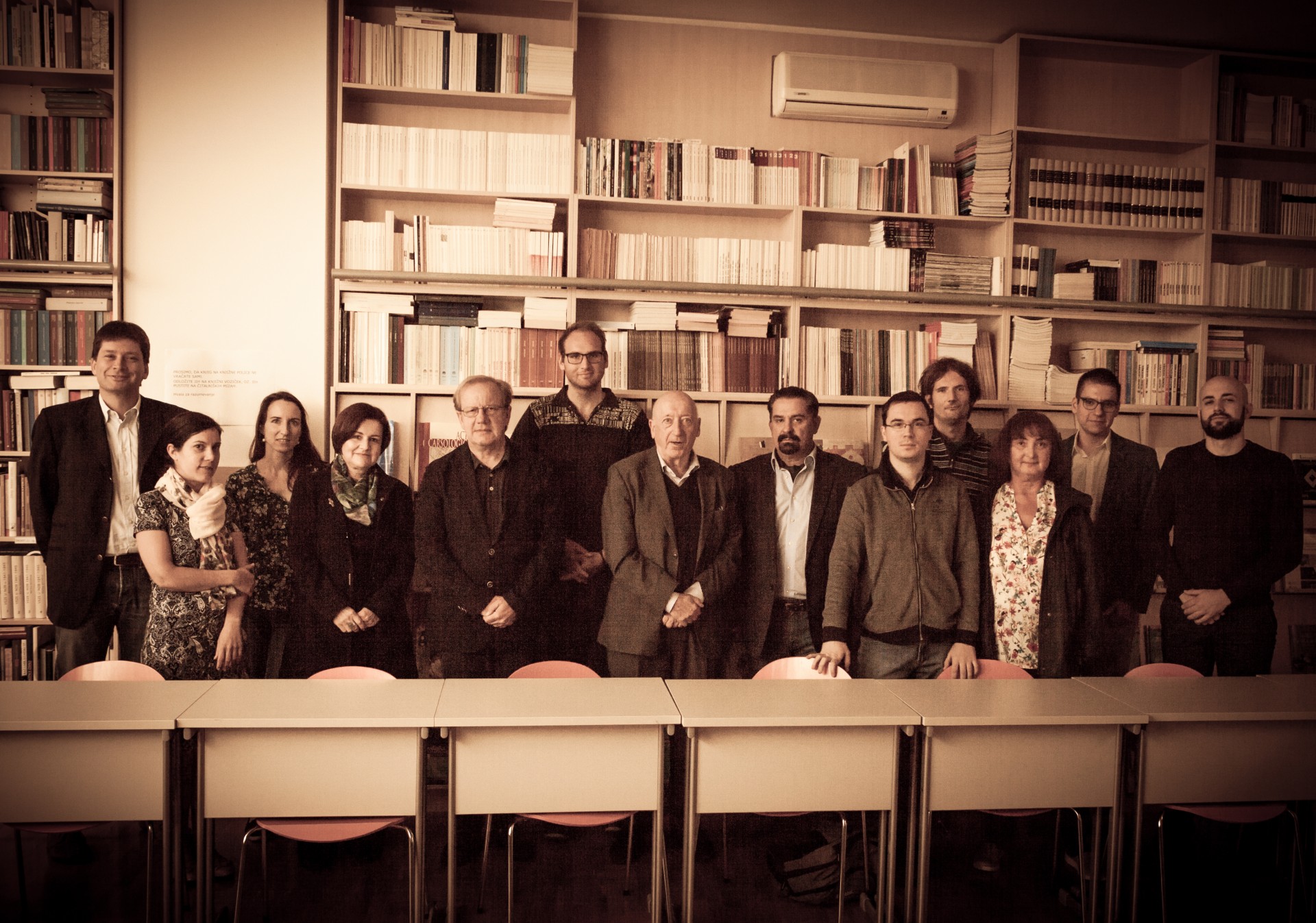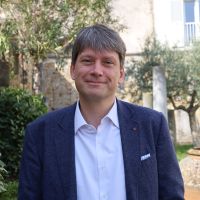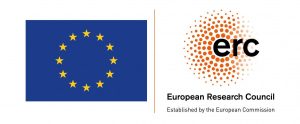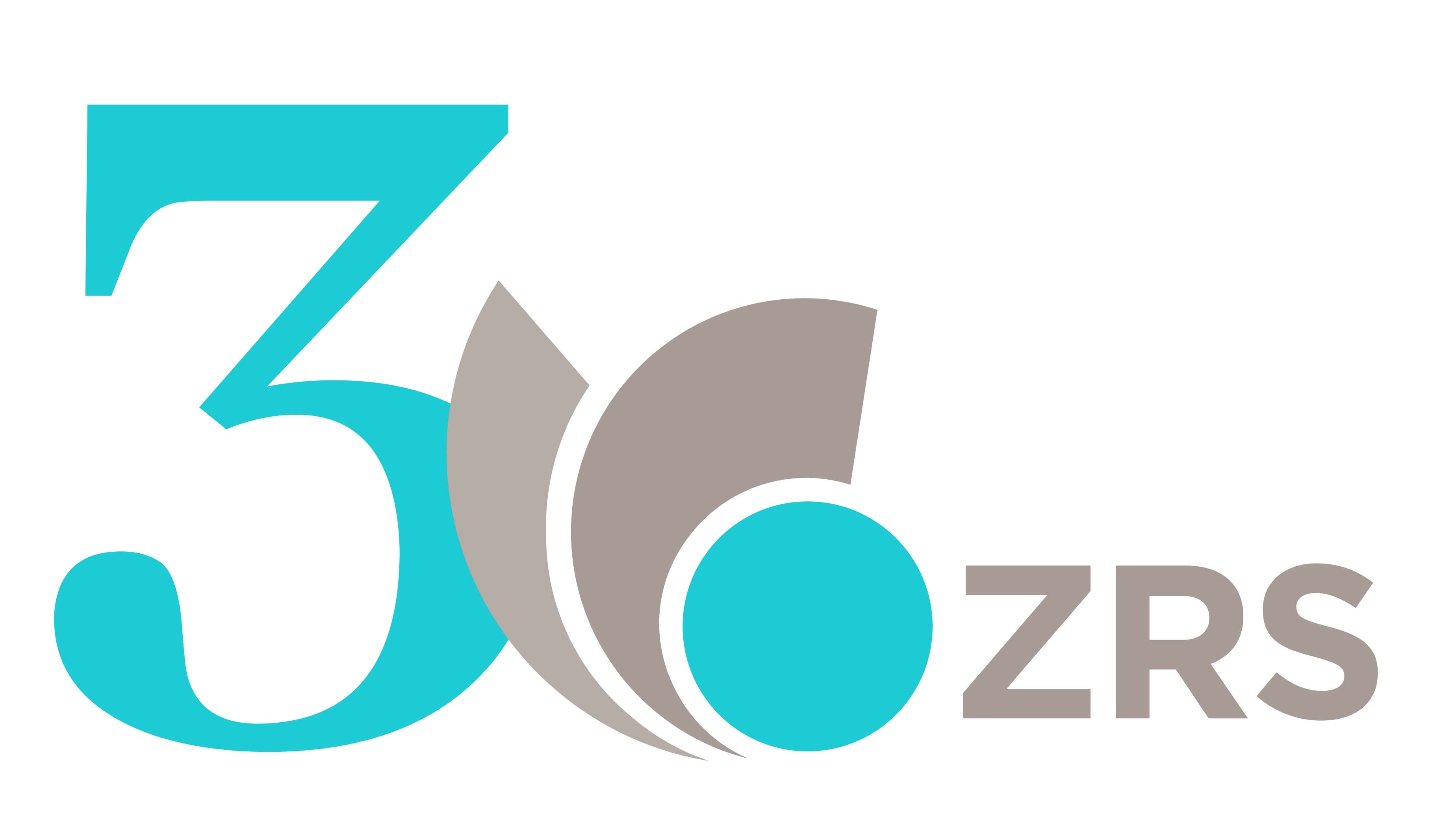
PRESENTATION
The Institute for Historical Studies with its collaborators presents a strong research centre at the junction of the South Slavic, Romanic and Germanic area in the northern Adriatic. The members of the Institute deal with diplomatic, political, economic, cultural and art history as well as the history of everyday life and the history of religions. These experts are among the most recognizable researchers in Slovenia and in the area of former Yugoslavia. They are also renowned in Europe, not only for their numerous monographs and articles, but also through their cooperation with international research centres, especially in Italy, Germany, Austria and elsewhere..
Competences and achievements
The Institute is regarded as a reference research centre for the cross-border area in the northern Adriatic area, as evidenced by many successfully completed national, bilateral and European projects. With their thematic and methodological specializations, the researchers at the Institute manage to carry out complex studies in which they tend to include partners from Europe and other continents. Besides basic historiographic research, they also cooperate in numerous applied projects in cooperation with state institutions, NGOs and economy sector, focusing primarily on valorisation and use of cultural heritage in society, economy and education.
Mission and vision
In the future, the Institute plans to direct its potentials in border studies in the contact area between Central Europe and the Mediterranean in the »long term« from the early modern to the latest history, as well as in studying the political, ideological, economic, social, cultural and religious dynamics of this region in wider cultural space and in a global context.
Researchers of older periods of history will focus on social and cultural history of urban institutions, on the issues of social discipline and control, crisis and crisis management, resolution of social issues and establishment of social policies and also other aspects of social life both in the region and in comparison with the wider cultural environment.
Research of modern and contemporary history, combining the study of totalitarian and authoritarian ideologies and regimes in a transnational perspective, the specifics of both World Wars and the Cold War and the phenomenon of interspersed memory in the border region, and in the recent years also the study of diplomatic history of socialist Yugoslavia, all of which will be deepened and upgraded in the coming years. In addition to the based programme, the researchers at the Institute will strengthen the activities in the field of studying global challenges in both historical and topical perspective. In this context, the main focus will be on the phenomenon of the Non-Aligned Movement and the role of Yugoslavia in the Cold War period, using modern epistemological and methodological approaches to the history of international relations.
Head: Egon Pelikan, PhD, Principal Research Associate
E-mail: izs@zrs-kp.si
Phone: +386 5 663 77 32
RESEARCHERS

Egon Pelikan, PhD

Tilen Glavina, PhD

Urška Bratož, PhD

Dragica Čeč, PhD

Štefan Hadalin

Sara Hajdinac

Nina Hofmann

Borut Klabjan, PhD

Gašper Mithans, PhD

Oskar Opassi

Vojko Pavlin, PhD

akad. Jože Pirjevec, PhD

Claudio Povolo, PhD

Jure Ramšak, PhD

Mateja Režek, PhD

Vida Rožac Darovec

Urška Strle, dr.

Tomislav Vignjević, PhD

Federico Tenca Montini, PhD
RESEARCH PROGRAMMES
Mediterranean and Slovenia (P6-0272)
The aim of the programme entitled “The Mediterranean and Slovenia” is to continue the studies dealing with Primorska liminality as reflected in the interaction of Mediterranean and central European social and economic systems and institutions, various types of administration and structural characteristics of Primorska towns, social and production relations, legal systems and other differences, which resulted in multilateral blending of cultures on the one hand, and in antagonisms and consequently social, interethnic and international conflicts on the other.
The programme will analyze political, social and demographical changes in this border area from the perspective of “long duration”. The analysis will take into account the multifaceted dependence of this area on various policies (economic, demographical, social, etc.) and radical political changes, which affected it throughout its history. The issues addressed will be dealt with not only from the point of view of political and diplomatic shifting of borders, but also from the economic, social, ethnic, cultural and civilizational perspectives.
The programme will include the analysis of architectural remains and material culture, the aim of which is to reconstruct settlement patterns and to define broader historical and economic processes. It will also investigate the social and cultural history of town-run institutions, the issue of imposing social discipline and control, crises and their management, the solutions to social issues and the development of social policies, and other significant aspects of social life.
The research into contemporary history will shed light on totalitarian and authoritative ideologies (“border fascism”, “border socialism”) and regimes in Primorska, international dimensions of resistance movement during WWII, and the transformation of the social structure as a result of political changes, with special emphasis on the re-population of the coastal area and the formation of the new social reality. The researchers will also address the key issues of divided memory in this border area.
The programme will continue to systematically collect and register different types of sources kept by Slovene and foreign archives, as well as to update and upgrade the existing databases, which will serve as a basis for further research into historical demography and social history. Special attention will be paid to archival materials that shed a new light on even the most disputed issues related to the common past.
Methodologically speaking, the programme group will aspire to surpass nationally centered narratives by employing the comparative and transnational approaches, as well as the so called ‘histoire croisée’. It will perform quantitative analyses, employ quality reading of historical materials, and carry out data cross-comparisons. Placing special emphasis on relations between the centre and the peripheral/border areas, the research will be pronouncedly comparative in nature.
ARRS Code: P6-0272
Period: 1. 1. 2015 – 31. 12. 2019
Programme leader: Acad. Jože Pirjevec, PhD, Principal Research Fellow
ONGOING RESEARCH PROJECTS
Religious Change in Slovenia and Yugoslavia: Religious Conversions and Processes of Atheization (N6-0173)
The project aims to explore religious transformations in 20th century Slovenia and Yugoslavia marked by various kinds of religious agency that cuts across established norms, legal frameworks, and cultural expectations. This constitutes one of the first study in the region using a broad-based understanding of religious conversions to probe the religious changes in Slovenia and Yugoslavia and the process of formation or reformation of religious minorities. The interdisciplinary project combines historical, anthropological and other relational approaches, and offers a perspectival shift from limitations of nation-centred history to provide a comprehensive transnational study and a more nuanced understanding of mechanisms driving religious change and state-religion relations in Slovenian and Yugoslav context. The position of former Yugoslavia and Slovenia in particular is unique in Europe to perform such research, as it is marked by frequent changes of political regimes, recent experience of war, and social tensions based on ethnic and religious grounds that have only been intensified by internal and international migrations.
ARRS Code: N6-0173
Project duration: 1. 12. 2021–30. 11. 2024
Project leader: Gašper Mithans, PhD, Senior Research Associate
Participating institute ZRS Koper: Institut for Historical Studies
Cultural-historical aspects of senescence: experiences, representations, identities (J6-2572)
ARRS Code: J6-2572
Project duration: 1. 9. 2020 – 31. 8. 2023
Project leader: Urška Bratož, PhD
Project holder: ZRS Koper, Institute for historical studies
The research will focus on the cultural and social aspects of aging in 19th and 20th centuries in the territory of current Slovenia. The old age will be addressed through interdisciplinary approaches as a social and cultural construct and will underline the complexity and plurality of experiencing old age. Project will underline the importance of connecting cultural representations of old age with individual experiences through the perspective of gender. In this perspective the following (between themselves closely intertwined) work packages will be taken into consideration:
- Population age structure, ubiquity of the elderly between 1848 and 1914;
- Aging body: biological characteristics of senescence;
- Gendered images of old age;
- Political, social, cultural, legal and economic meanings of old age;
- Individual perceptions of aging and old age, the construction of new identities.
Antifascism in the Julian March in a Transnational Perspective, 1919–1954 (J6-9356)
The project “Antifascism in the Julian March in a Transnational Perspective, 1919–1954” will examine the special characteristics and lesser known aspects of the antifascist resistance in the former Julian March, and its role in the wider European context. The research will focus on the phenomenon of antifascism as it developed in response to the “borderland fascism” (fascismo di confine) characteristic of this multiethnic border region, and take into consideration the period spanning from the emergence of fascism in Italy (1919) to the division of the Free Territory of Trieste between Italy and Yugoslavia (1954).
The objectives of the proposed project are: 1) analysis of ideological, social and national premises of antifascism in the former Julian March; 2) research into antifascist groups and movements of various ideological-political provenances, and analysis of various practices of their antifascist engagement from theoretical, artistic, and political, to intelligence and terrorist activities, as well as organized armed resistance; 3) research into interactions between local antifascist groups, their connections with other antifascist movements and organizations in Europe, and international transfers of ideas and tactics; 4) analysis of women’s emancipation within the antifascist movement; 5) analysis of antifascist symbols and discourse employed in fine arts and literature; and 6) research into the formation of collective memory of antifascism along the Yugoslav-Italian border after WWII.
Special emphasis will be paid to Slovenian antifascist groups and individuals whose engagement was characterized by transnational cooperation in the Italian and wider European context. Due to the interactions between the national impulse and forms of action with different ideological backgrounds, as well as the earliness of spontaneous resistance and its international character, the antifascism in the Julian March was characterized by a dimension that can be best approached through methods of transnational and comparative history. Applying these approaches, the project will introduce recent methodological tools and problematize new historical aspects of this borderland region. Such an approach will enable participating researchers to enter more actively into dialogue with the international historiographical community, which has in recent years shown an increasing interest in researching antifascism, and stressed the importance of research into political and cultural aspects of antifascism in various European regions with common or similar features.
Taking into account the findings of previous studies by Slovenian, Croatian, Italian, and other scholars, the proposed research will be based on archival and other historical sources. The key archival holdings for the proposed project, which have already been partially researched or at least registered by the project leader and members of the project group, are kept by the various Slovenian, Croatian, Serbian and Italian archives or private collections, while contacts with foreign agents will be analyzed on the basis of the documents kept by Russian, British, Vatican, and other archives, which have also been partly registered by the participating researchers.
The feasibility of the project is ensured by the project leader’s ample knowledge and years of experience, as well as by previous successful collaboration of the participating researchers in several projects. In order to achieve the set goals, the project will be divided into several interrelated sections, with the segments being in line with research interests of the project team composed of experienced scholars, as well as younger researchers at the beginning of their academic career.
ARRS Code: J5-9356
Period: 1. 7. 2018 – 30. 6. 2021
Project leader: Acad. Jože Pirjevec, PhD, Principal Research Fellow
Participating institute ZRS Koper: ZRS Koper, Institute for Historical Studies
Adriatic Welfare States. Social Politics in a Transnational Borderland from the mid-19th until the 21st Century (J6-1800)
ARRS Code: J6-1800
Period: 1. 7. 2019 – 30. 6. 2022
Project leader: Borut Klabjan, PhD, Principal Research Fellow
Participating institute ZRS Koper: Institut for Historical Studies
The Engagement Between Marxism and Christianity in Slovenia, 1931–1991 (J6-9353)
Our investigation follows this entwinement between left-oriented Catholicism and Marxism in Slovenia from the 1930s, when a group of Christian Socialists separated from the mainstream spirit of Christian integrism and drew increasingly closer to the ideological premises of Marxism, to the early 1990s, when socialism still appeared to some Catholics as the “sign of the times.” With the aim of carrying out a complex analysis of the phenomenon described, we will conduct the research using a transnational approach that will include the methods of intellectual, political and diplomatic histories, the sociology of religion, theology and the anthropology of religion.
Research project will produce a set of scientific outputs with the aim of launching an academic debate and engaging the public by achieving the following goals: 1) to contextualise and provide a novel epistemological insight into the intellectual achievements of left-oriented Slovene theology in the realm of global contemporary and current political theologies; 2) to offer a new perspective of the processes of intellectual transfer between Slovenia and various parts of Europe, the United States, South America and other regions of the world; 3) to compare visions and dilemmas of Slovene Christian Socialists with left-oriented Christian groups in Europe before, during and after WWII; 4) to provide a new angle on the problematic cooperation between Christians and Communists during WWII; 5) to explore the extent of the ideological and political impact of left-oriented Catholicism on the Yugoslav socialist self-management system and understand the significance of Yugoslavia for the Vatican’s “Ostpolitik”; 6) to provide insight into past and contemporary strands of political theological thinking in Slovenia and critically analyse the present so called “atheist turn” within this thought.
ARRS Code: J5-9353
Period: 1. 7. 2018 – 30. 6. 2021
Project leader: Jure Ramšak, PhD, Research Fellow
Participating institute ZRS Koper: ZRS Koper, Institute for Historical Studies
National Self-Assertion Versus Transnational Scholarship: the Impact of National Discourses on the Medieval and Early Modern Art History in Slovenia (J6-9387)
Within the context of increasing national self-awareness in the late 19th century, the Slovenians, like other nations living in the Austro-Hungarian Empire, began to search for elements that could be understood as part of their national identity in the field of humanities, as well as in arts and architecture. Around 1900 first attempts of creating a national style in art and architecture can be noted. Moreover, some of the younger painters emphasized that they were “the first real Slovenian” artists. At the same time, first Slovenian students were studying art history in Vienna and Graz. In Vienna, Josip Mantuani received his Ph.D. with Franz Wickhoff as advisor in 1894, France Stelè and Izidor Cankar with Max Dvořak in 1912 and 1913, and Vojeslav Molè, also in 1912, with Josef Strzygowski. The latter was also the Doktorvater to Avguštin Stegenšek, who received his Ph.D. in Graz in 1906.
With the end of the World War I, most the Slovenes were united in a new multinational state the Kingdom of Serbs, Croats and Slovenes, which changed its name in 1929 to the Kingdom of Yugoslavia. Thus, the provincial institutions established throughout the 19th century were given the role of main national institutions (as was the case of the Provincial Museum of Carniola in Ljubljana which was to become the National Museum of Slovenia); some others, especially the National Gallery, were established after 1918. Art history also obtained one of the first chairs at the new University of Ljubljana, established in 1919. The abovementioned former students from Vienna played key roles in these events: Mantuani was the director of the National Museum, Cankar and Molè became the first professors at the University, and Stelè was the head of the institute for the protection of cultural heritage. The 1920s and 1930s were important (and decisive) years for the further development of the Slovenian art history: apart from the full-time study programme at the university, the professional organization was established (Slovenian association of art historians) as well as the first scientific journal. During this period, theoretical studies on style, as well as surveys of the Slovenian art were published (written by Cankar and Stelè). In his Outline of History of Art of Slovenians of 1924, Stelè tried to answer the question of national elements in the art and architecture of Slovenian territory, and this became one of the issues that dominated the Slovenian art history throughout most of the 20th century. During this period the initially rather wide in terms of subject matter, and theoretically based on the Vienna school, Slovenian art history slowly narrowed itself to local antiquarianism.
During the last decade or two, especially in Central Europe, several conferences addressed the questions of the relationship and interaction between art and art history with politics, ideology, and cultural context. At these occasions, Slovenia usually wasn’t addressed. Our project will therefore focus on analysis of the impact of national discourses on the medieval and early modern art history in Slovenia, esp. early art history studies of present-day territory of the Republic of Slovenia, written in the period of Austria-Hungary, the process of establishing “national” institutions (museums, university) and the development of their programs; the creation of dichotomy between “domestic/Slovenian” and “foreign” art and artists, and of the canon of “Slovenian” art, mostly in the context of scholarly and popular art historical surveys and larger museum exhibitions; different views of Italian, Austrian, Slovenian, Hungarian, and Croatian art historians on art heritage of Istria, and Prekmurje, international activities of art historians from Slovenia.
ARRS Code: J6-9387
Period: 1. 7. 2018 – 30. 6. 2021
Project leader: Matej Klemenčič, PhD
Lead partner of the project: University of Ljubljana, Faculty of Arts
Participating institute ZRS Koper: ZRS Koper, Institute for Historical Studies
Borders in Arms. Political Violence in the northern Adriatic, 1914-1941 (J6-7152)
This project analyzes forms of political violence by examining its relationship to identity and ideology from a historical perspective in the region of the northern Adriatic that today is shared by Italy, Slovenia and Croatia. The time frame spans from the beginning of World War I in July 1914 to April 1941, when the Italian army invaded neighboring Yugoslavia in World War II.
The Great War and the disappearance of the Habsburg Empire turned the northern Adriatic in a “shatter zone” (Bartov, Weitz), where the ambiguity of the situation created a space without clear and defined state authority. The Austrian Littoral has been replaced by the Italian Venezia Giulia, however this sortie de guerre (Prost) has not been linear. The transition lasted several years and has been characterized by extreme political instability, economic insecurity, military and cultural demobilization of heart and minds (Horne) and it became a laboratory for new forms of military and paramilitary violence (fascist squads). This occurred in the vacuum left by the collapse of the Habsburg Empire, however at the same time violence served as an adjunct to the new State power and its legitimization. Thus, waves of State violence occurred in different forms in the 1920’s and 1930’s and gave rise to forms of counter-violence based on terrorist activity throughout the period under scrutiny. The question of how different societies managed to interact despite volatile and hostile political conditions is of enormous importance to the history of the northern Adriatic region and of Europe in general.
Many important works have contributed to intense historical analysis of this area however, a transnational perspective has only rarely been adopted. Thus we are planning to use interdisciplinary and comparative approaches to study the region as a whole irrespective of its today’s political and administrative division. We believe that is the only way to transcend exclusivist (national) interpretations of the history of the region.
In order to re-think and re-frame the history of violence in the region we will use published and unpublished material. Moreover, the methodology of top-down and bottom-up perspectives will be used, both in analyzing archival documents of State authorities (national archives in Rome, Zagreb, Ljubljana, and local archives in Koper, Trieste, Gorica and Nova Gorica, Rijeka and Pazin) and in analyzing documents produced by non-state actors (biographies of veterans, members of Fascist militia, Slovene terrorist groups – TIGR, etc.).
ARRS Code: J6-7152
Period: 1. 1. 2016 – 31. 12. 2018
Project leader: Borut Klabjan, PhD, Senior Research Fellow
Participating institute ZRS Koper: Institut for Historical Studies
Ambition, careerism, greed, betrayal: social-material strategies, practices, and communication of social elites in the Slovenian territory during the Early Modern Period (J6-2575)
ARRS Code: J6-2575
Project duration: 01. 09. 2020 – 31. 08. 2023
Project leader: Dušan Kos, PhD
Project holder: Znanstvenoraziskovalni center Slovenske akademije znanosti in umetnosti
Participating institute of the SRC Koper: Institute for historical studies
Models and Practices of Global Cultural Exchange and Non-aligned Movement: Research in the Spatio-Temporal Cultural Dynamics (J7-2606)
ARRS Code: J7-2606
Project duration: 01. 09. 2020 – 31. 08. 2023
Project leader: Barbara Predan, PhD
Project holder: University of Ljubljana, Academy of Fine Arts
Participating institute of the SRC Koper: Institute for historical studies
National Self-Assertion Versus Transnational Scholarship: the Impact of National Discourses on the Medieval and Early Modern Art History in Slovenia (J6-9387)
Within the context of increasing national self-awareness in the late 19th century, the Slovenians, like other nations living in the Austro-Hungarian Empire, began to search for elements that could be understood as part of their national identity in the field of humanities, as well as in arts and architecture. Around 1900 first attempts of creating a national style in art and architecture can be noted. Moreover, some of the younger painters emphasized that they were “the first real Slovenian” artists. At the same time, first Slovenian students were studying art history in Vienna and Graz. In Vienna, Josip Mantuani received his Ph.D. with Franz Wickhoff as advisor in 1894, France Stelè and Izidor Cankar with Max Dvořak in 1912 and 1913, and Vojeslav Molè, also in 1912, with Josef Strzygowski. The latter was also the Doktorvater to Avguštin Stegenšek, who received his Ph.D. in Graz in 1906.
With the end of the World War I, most the Slovenes were united in a new multinational state the Kingdom of Serbs, Croats and Slovenes, which changed its name in 1929 to the Kingdom of Yugoslavia. Thus, the provincial institutions established throughout the 19th century were given the role of main national institutions (as was the case of the Provincial Museum of Carniola in Ljubljana which was to become the National Museum of Slovenia); some others, especially the National Gallery, were established after 1918. Art history also obtained one of the first chairs at the new University of Ljubljana, established in 1919. The abovementioned former students from Vienna played key roles in these events: Mantuani was the director of the National Museum, Cankar and Molè became the first professors at the University, and Stelè was the head of the institute for the protection of cultural heritage. The 1920s and 1930s were important (and decisive) years for the further development of the Slovenian art history: apart from the full-time study programme at the university, the professional organization was established (Slovenian association of art historians) as well as the first scientific journal. During this period, theoretical studies on style, as well as surveys of the Slovenian art were published (written by Cankar and Stelè). In his Outline of History of Art of Slovenians of 1924, Stelè tried to answer the question of national elements in the art and architecture of Slovenian territory, and this became one of the issues that dominated the Slovenian art history throughout most of the 20th century. During this period the initially rather wide in terms of subject matter, and theoretically based on the Vienna school, Slovenian art history slowly narrowed itself to local antiquarianism.
During the last decade or two, especially in Central Europe, several conferences addressed the questions of the relationship and interaction between art and art history with politics, ideology, and cultural context. At these occasions, Slovenia usually wasn’t addressed. Our project will therefore focus on analysis of the impact of national discourses on the medieval and early modern art history in Slovenia, esp. early art history studies of present-day territory of the Republic of Slovenia, written in the period of Austria-Hungary, the process of establishing “national” institutions (museums, university) and the development of their programs; the creation of dichotomy between “domestic/Slovenian” and “foreign” art and artists, and of the canon of “Slovenian” art, mostly in the context of scholarly and popular art historical surveys and larger museum exhibitions; different views of Italian, Austrian, Slovenian, Hungarian, and Croatian art historians on art heritage of Istria, and Prekmurje, international activities of art historians from Slovenia.
ARRS Code: J6-9387
Period: 1. 7. 2018 – 30. 06. 2021
Project leader: Klemenčič Matej, PhD
Lead partner of the project: University of Ljubljana, Faculty of Arts
Participating institute ZRS Koper: Institute for Historical Studies
FINISHED RESEARCH PROJECTS
Yugoslav Self-Management Experiment and the Discussion on Development of European Socialism between East and West (1950-1980) (N6-0039)
Projekt je namenjen ponovnemu premisleku o jugoslovanskem sistemu socialističnega samoupravljanja v mednarodni in transnacionalni perspektivi. V obdobju po sporu z Informbirojem je jugoslovanski sistem soočil različne akterje in tradicije evropske levičarske misli: na eni strani so ga zahodni levičarski krogi dojemali kot laboratorij demokratičnega socializma, na drugi pa je za vzhodnoevropske politike in intelektualce predstavljal model upora sovjetski hegemoniji. Analiza procesa nastanka in razvoja jugoslovanskega sistema samoupravljanja ponuja priložnost vpogleda v transnacionalno teoretsko-konceptualno in politično interakcijo, ki je v času hladne vojne prestopala meje med Vzhodom in Zahodom in odprla vprašanja združevanja načel liberalne demokracije in marksizma-leninizma, hkrati pa je razkrila tudi demokratične deficite enopartijskega sistema v Jugoslaviji.
Obravnava teoretske in politične interakcije, ki je prišla do izraza v okviru jugoslovanskega socialističnega eksperimenta, bo razdeljena na tri med seboj prepletene sklope:
1) Laboratorij politične inovacije: izvori, konstrukcija in mednarodni vplivi samoupravnega socializma;
2) Odpiranje različnih poti v socializem: Jugoslavija in mednarodno delavsko gibanje;
3) Jugoslavija kot prostor mednarodnega intelektualnega srečevanja: kritike institucionalnega in perspektive demokratičnega socializma.
Raziskava se bo oprla na izvirno arhivsko gradivo iz arhivov nekdanjih jugoslovanskih republik, Nemčije, Švedske, Norveške, Velike Britanije, Italije, Rusije idr. Vključevala bo metode transnacionalne zgodovine idej in diplomatske zgodovine. Medtem ko se bo analizi vloge nedržavnih faktorjev v procesu razvijanja jugoslovanskega socialističnega eksperimenta približala z uporabo transnacionalnih zgodovinopisnih pristopov, bodo vloga držav in oblasti ter razmerja moči obravnavana z metodami diplomatske zgodovine.
Temeljni cilj projekta je predstaviti posledice medsebojnih prenosov in vplivov politične misli in prakse, ki jo je na mednarodni ravni sprožil jugoslovanski samoupravni eksperiment, ter odgovoriti na vprašanje, kako je ta prispeval k teoriji demokratičnega socializma, pravičnejše svetovne ekonomske ureditve, ohranjanja miru in drugih še danes aktualnih izzivov.
ARRS Code: N6-0039
Period: 1. 7. 2015 – 31. 8. 2018
Project leader: Acad. Jože Pirjevec, PhD, Principal Research Fellow
Participating institute ZRS Koper: Institut for Historical Studies
Everyday religious practices and convertism in Slovenia (1918-1941) - (Z7-7006)
In the Kingdom of SHS/Yugoslavia, religions and legal systems of different backgrounds and traditions met. As the key upholder of the “old order”, the Roman Catholic Church (RCC) in the Slovenian part of Yugoslavia maintained its dominant position, yet was confronted by the multiconfessionalism of the new state. The process of modernisation was slowed down due to general conservatism and the economic backwardness of the state. Various groups within the Slovenian RCC reacted differently to this process, which shattered its political unity. In order to analyse these particularities and to produce research comparable to studies of the situation in other regions of Europe, the relations between different religious communities in the territory and the historical contexts of different European regions must be compared.
The project is divided into three sections:
In the first part, the mechanisms and relations of power between the main actors in the religious field in Slovenia in the period between the World Wars will be researched. Here, the project originates from a problematisation of Bourdieu’s conceptualisation of the religious field (the symbolic dimension).
The second part will complement preliminary findings through a study of indirect and direct interactions between laypeople and “religious specialists” in the case of the majority religious community (Catholics). This analysis emphasises social relations and everyday religious practice (the social dimension). Both theoretically based parts will provide the theoretical and conceptual framework for the last part.
In the framework of a case study of religious conversion and inter-religious relations in interwar Slovenia, the phenomenon of religious conversion will be studied, where we follow the recent trend in history and anthropology that emphasises the plurality of social identities. By researching the cultural transfers of religious conversion, we can uncover important aspects of the transformations, continuities and transmissions in a multicultural society.
The core objectives of the research are:
- the construction of a theoretical and conceptual framework for the analysis of “strategies” and “tactics” in the religious field;
- a working definition of the term layperson;
- identification and definition of different types of religious conversion;
- analysis of selected “converts” and the reactions of religious communities to conversions.
Taking into account the national (Slovenia) and the regional (South-eastern Europe) historical context, the inappropriate use of “Western” concepts will be modified and reflected upon. In this way, the first pertinent research on conversion in this territory will be carried out.
With a historical-anthropological scientific apparatus, we will carry out archive research (Archdiocesan Archives of Ljubljana, Archdiocesan Archives of Maribor, Archives of the Republic of Slovenia, Historical Archives of Celje, Historical Archives of Ljubljana, Historical Archives of Ptuj, Diocesan Archives of Trieste, Archives of the Serbian Orthodox Church Parish of Ljubljana, etc.), brief fieldwork aimed at gathering material, and discursive analysis of selected texts. Narration through (auto)biographical sources, specific personal heirlooms, newspapers, and visual material will be examined. As research on conversion is to a large extent based on so-called ego-documents, a specific methodological treatment will be dedicated to this. The focus in all source analysis will be on critical reading, taking into account the regimes of historicity.
ARRS Code: Z7-7006
Period: 01. 01. 2016 – 31. 12. 2017
Project leader: Gašper Mithans, PhD, Research Fellow
Participating institute ZRS Koper: Institute for Historical Studies
Kraji spomina, kraji meje: spomin in identiteta na slovensko-italijanskem mejnem območju v dolgem dvajsetem stoletju (J6-6833)
Evidenčna številka ARRS: J6-6833
Obdobje: 1. 7. 2014 – 30. 6. 2017
Vodja: dr. Borut Klabjan, višji znanstveni sodelavec
Sodelujoči inštitut ZRS Koper: Inštitut za zgodovinske študije
Preučevano območje krajev spomina bo prostor slovensko-italijanske meje, na katerem so, za razliko od drugih evropskih regij, vprašanja politike in spomina zanemarjena. Projekt bo skušal združiti orodja raznorodnih disciplin, s katerimi bi se rad približal odgovorom na vprašanja o razumevanju kulture spomina, komemoracije in politike spomina. Kako se prepletajo, oblikujejo in prekrivajo na obmejnih območjih?
Od začetka dvajsetega stoletja dalje je bila obmejna regija podvržena rednim spremembam meja in državnih sistemov. Kako so zaradi različnih sovražnih ali ohlapnih političnih razmer sodelovale različne družbe, je vprašanje, ki ima za zgodovino regije velik pomen. Hkrati gre za vprašanje evropske in globalne zgodovine: na tem območju so bile začrtane močne simbolne meje, ki so vplivale na oblikovanje mentalnega zemljevida Evrope: Zahod proti Vzhodu, latinski proti slovanskemu svetu, Evropa proti Orientu, antifašizem proti fašizmu, demokracija proti komunizmu. Prav to definira slovensko-italijansko mejo za idealno regijo za študijo primera, ki ima velik evropski pomen.
K zgodovinski analizi območja so prispevala številna pomembna dela, pri čemer velja opomniti, da je bil le redko upoštevan transnacionalni vidik. Zato načrtujemo uporabo interdisciplinarnih in primerjalnih pristopov za študij regije kot celote, ne glede na njeno današnjo politično in administrativno delitev. Verjamemo, da je to edini način za preseganje izključujočih (nacionalnih) interpretacij.
Za izvedbo tega pristopa predlagamo naslednje med seboj povezane študije primerov:
- Imperialni kraji spomina, ki so nastali pred 1. svetovno vojno (npr. spomeniki habsburškim vladarjem in spomeniki, povezani z vladajočo dinastijo);
- Kraji spomina prve svetovne vojne, ki so bili postavljeni v dvajsetih in tridesetih letih. (npr. spominski parki v Gorici in Trstu, kostnice v Sredipolju in Kobaridu);
- Tržaški Narodni dom kot kraj spomina;
- Sakralna umetnost lokalnih cerkva kot kraj spomina;
- Kraji spomina druge svetovne vojne (npr. spomeniki partizanskemu gibanju, koncentracijsko taborišče Rižarna in druga taborišča na omenjenem ozemlju, denimo Gonars in Visco);
- Bazovica kot kraj razdeljenega spomina;
- Kraji spomina “obmejnega potrošništva” (npr. Ponterosso v Trstu);
- Kraji spomina obmejnega sodelovanja (npr. iniciativa za odprto mejo kot kraj spomina na najbolj odprto mejo razdeljene Evrope);
- Regionalni muzeji kot kraji javnega spomina (npr. Museo della civiltà Istriana, fiumana e dalmata in Museo del Risorgimento v Trstu, regionalna muzeja v Kopru in Novi Gorici itd.).
V svojih analizah bomo uporabili že objavljeno in še neobjavljeno gradivo. Še več, metodologija top-down in bottom-up bo uporabljena za analizo arhivskih dokumentov državnih oblasti (državni arhiv v Rimu, Ljubljani, na Dunaju ter lokalni arhivi v Kopru, Trstu in Gorici) in medijev. Pozornost bo namenjena tudi ustni zgodovini in antropološkim metodam.
Raziskovalna skupina je sestavljena iz uveljavljenih profesorjev, izkušenih raziskovalcev (4-10 let po doktoratu) in štirih mladih raziskovalcev. Je interdisciplinarna in interinstitucionalna.
Oblikovan bo tudi mednarodni svetovalni odbor, ki ga bodo sestavljali Nancy Wingfield, Sabine Rutar, Vanni D’Alessio in Katia Pizzi.
Diseminacijska strategija vključuje merila, ki bodo poskrbela za objavo izsledkov projekta v ustreznih raziskovalnih razpravah – v obliki knjige in/ali člankov v slovenskih in tujih strokovnih publikacijah, na gostujočih predavanjih in konferencah. Za širitev projekta v ne-akademsko skupnosti načrtujemo spletno stran in oblikovanje ter predvajanje radijskih oddaj.
Rezultati se bodo zrcalili tudi v učnem procesu na univerzitetni ravni, pa tudi kot delavnice za srednješolske učitelje.
Slovenski diplomati in zunanjepolitični vidiki osamosvajanja Republike Slovenije, 1980-1992 (J6-6832)
Evidenčna številka ARRS: J6-6832
Obdobje: 1. 7. 2014 – 30. 6. 2017
Vodja: akad. dr. Jože Pirjevec, znanstveni svetnik
Sodelujoči inštitut ZRS Koper: Inštitut za zgodovinske študije
Namen projekta je sistematična analiza in historična rekonstrukcija delovanja slovenskih diplomatov in drugih zunanjepolitičnih akterjev v kontekstu razkrajanja avtoritarnega sistema in jugoslovanske federacije ter velikih sprememb v mednarodni politiki v obdobju 1980–1992. Čeprav gre za prelomno obdobje razpadanja Jugoslavije in osamosvajanja Slovenije, so bili, v nasprotju z notranjepolitičnimi in obrambnimi aspekti, zunanjepolitični vidiki nastajanja nove države doslej raziskani le na splošni, pregledni ravni. Projekt se umešča v kontekst preučevanja diplomatske zgodovine, ki se šele v zadnjih letih konstituira kot samostojna smer znotraj slovenskega zgodovinopisja. Hkrati pomeni nadaljevanje sistematične raziskave sodobne slovenske diplomatske zgodovine v okviru projekta Slovenci v jugoslovanski diplomaciji in v zunanjepolitičnem delovanju 1941–1980, ki ga od leta 2011 izvajamo na UP ZRS v Kopru. Čeprav je bilo naslednje obdobje od 1980 do 1992 prelomno, so dosedanje znanstvene raziskave zunanjepolitičnih vidikov osamosvajanja Slovenije omejene le na glavne diplomatske poteze slovenskega vodstva v letu 1991, medtem ko so republiške zunanjepolitične pobude v osemdesetih letih skoraj povsem spregledane. Poleg tega je v sicer številnih tujih znanstvenih delih, ki obravnavajo odnos zunanjih sil do razdružitve Jugoslavije, dogajanje v Sloveniji v senci vojn na Hrvaškem in v BiH ter največkrat obravnavano obrobno ali kot predmet posameznih razprav.
Vsebinsko je projekt razdeljen na tri med seboj povezane sklope:
- Republiška zunanjepolitična pobuda v osemdesetih letih;
- Oblikovanje zunanje politike samostojne države;
- Odnos velikih sil do Jugoslavije in njene razdružitve.
Raziskava bo temeljila na kritični analizi in interpretaciji zgodovinskih virov in relevantne literature, njen izvirni del pa se bo opiral predvsem na arhivske in ustne vire, z zbiranjem katerih imajo sodelujoči raziskovalci že veliko izkušenj iz dosedanjega projekta. V zvezi z razpadanjem Jugoslavije in osamosvajanjem Slovenije sta projektni vodja in projektni partner že objavila temeljni referenčni deli (J. Pirjevec, Le guerre jugoslave 1991–1999, 2001; B. Repe, Jutri je nov dan: Slovenci in razpad Jugoslavije, 2002), ki na pregledni ravni obravnavata tudi nekatere zunanjepolitične aspekte tega procesa. Projektna skupina se bo zato osredotočila na manj znana ozadja oblikovanja diplomatske mreže nove države, dvojno funkcijo Slovencev v jugoslovanskem diplomatskem korpusu, odnose z drugimi jugoslovanskimi republikami, vlogo srednjeevropskih držav v prizadevanjih za mednarodno priznanje Slovenije idr. Republiške zunanjepolitične pobude v osemdesetih letih in diplomatski vidiki osamosvajanja Slovenije bodo rekonstruirani na podlagi domačih in tujih arhivskih virov ter ustnih pričevanj, raziskava odnosa velikih sil do Jugoslavije in njene razdružitve pa se bo pretežno opirala na dostopne vire v tujini (Washington, Pariz, Berlin idr.), ki so jih projektni sodelavci v precejšnji meri že evidentirali, dopolnila pa jih bodo tudi ustna pričevanja. Projektne aktivnosti bodo trdno izhodišče za vključitev sodelujočih raziskovalcev v širšo razpravo o zunanjepolitičnih vidikih razpadanja Jugoslavije in posledično za večjo prepoznavnost in primerljivost slovenske historiografije.
Obmejni fašizem - socialna in kulturna zgodovina fašizma na Primorskem (J5-5551)
Evidenčna številka ARRS: J5-5551
Obdobje: 1. 8. 2013 – 31. 7. 2016
Vodja: dr. Egon Pelikan, znanstveni svetnik
Sodelujoči inštitut ZRS Koper: Inštitut za zgodovinske študije
Raziskovalni projekt »Obmejni fašizem« – Socialna in kulturna zgodovina« se bo usmeril v malo raziskovano področje – v kulturno in socialno zgodovino fašizma v Julijski krajini. Analiziral bo prakse, ki so zaznamovale področje novih provinc in so z ideološko markacijo oblikovale obmejni prostor v družbenem, kulturnem, urbanem, arhitekturnem, krajinskem, infrastrukturnem smislu.
V Julijski krajini sta v času med obema vojnama ideologija in posledično politična praksa fašizma »mutirali« v posebno obliko, v t. i. »obmejni fašizem« ((»fascismo di confine«).
Posebnost fašizma v »novo priključenih provincah« (t. i. »provincie nuove«) definira nekakšna »dvojna usmeritev«, saj je tu prepoznaval dva sočasna nasprotnika: v podobi slovanskih/slovenskih in hrvaških( nacionalnih nasprotnikov.
Pred režim se je z realnostjo na novo priključenih avstro-ogrskih dežel postavljalo vprašanje, kakšna naj bo celotna podoba »novih provinc«, ki jih je bilo po politični (formalni) priključitvi zdaj potrebno »vključiti« ne le v državni okvir, temveč tudi v novo ideološko realnost fašizma: kulturno, socialno, krajinsko, arhitekturno, infrastrukturno, gospodarsko itn.
Režim je zato (glede na druge dele države) deloval na politični ravni posebej izostreno na ideološki pa specifično, v dveh smereh – »navzven« (uradno).
To je vodilo v poudarjen ideološki nastop fašizma v Julijski krajini, ki je postala »izložbeno okno« ideoloških prvin režima – za »tujerodce« na eni in za mednarodno javnost na drugi. Še bolj kakor drugje v Italiji je režim zato v Julijski krajini nastopal (na eni strani v »lepi podobi«.
Področja raziskav so naslednja:
- Vloga državnih ustanov
- Vloga represivnega
- Ideologizacija družabnih dogodkov
- Imagologija – podoba »drugega«
- Markacija okolja s fašistično ideologijo in ideološka govorica v urbanem okolju
- »Romanizacija« Cerkve v Julijski krajini;
- Prodor ideologije v področje zasebnega
- Študije spolov
Interdisciplinarna metodologija vključuje analizo diskurzivnih praks, imagologijo, ikonografijo, onomastiko, zbiranje in analizo ustnih pričevanj, kakor tudi klasično metodologijo dela z arhivskimi viri. Raziskava učinkov ideologije in politike v prostoru bo, ob upoštevanju slovenske, italijanske ter druge tuje literature, vodila v večplastno predstavitev »podobe Julijske krajine« v času fašizma.
INTERNATIONAL RESEARCH PROJECTS
OPEN BORDERS
 |
 |
OPEN BORDERS – Cold War Europe Beyond Borders. A Transnational History of Cross-Border Practices in the Alps-Adriatic area from World War II to the present
European Commission: ERC Grant
Contract no.: 101054963
This project aims at rethinking the history of Cold War Europe by examining the development of transnational cross-border cooperation between “East” and “West” from the end of World War II to the present. Overcoming traditional visions of a clear-cut European separation symbolized by the Berlin wall, a decentralized analysis of recent European history will show us that the question of a divided continent should be reframed. To do this, the project team will focus on the Alps-Adriatic region, a historical area that today is shared by Austria, Italy, Slovenia and Croatia. In the Cold War it was divided among socialist but non-aligned Yugoslavia, capitalist but neutral Austria, and NATO and EEC member Italy. Its development from the “southern end” of the Iron Curtain in 1946 to the “most open border” in the Cold War and a precursor to the present-day Schengen Europe, represents a paradigmatic case to study an alternative attitude towards borders, frontiers and boundaries in general. While traditional historical research has concentrated on the role of high-level politics and State-to-State relations to explain the divisions of the Cold War, by focusing on the interplay between top-down politics and bottom-up initiatives, the Open Borders project will offer a social history of Cold War Europe from a border perspective. Reconsidering European history from this transnational angle, both in terms of geographical and methodological perspectives, will allow us to rediscover the human face of European integration and will offer us a new platform for contemporary global discussions on sovereignty, territoriality and belonging and on the future role of borders in Europe and in the world.
Project leader: Borut Klabjan, PhD
Project duration: 1. 1. 2023-31. 12. 2027
Participating institute ZRS Koper: Institute for Historical Studies
Merlin CV – Multisensorial Experiences Linked to Castles and Villas for Excellence in Tourism in Crossborder Region
Merlin CV – Multisensorial Experiences Linked to Castles and Villas for Excellence in Tourism in Crossborder Region
Interreg V-A Italija-Slovenija 2014-2020
Project duration: 1. 1. 2019 – 31. 12. 2021
Project leader at ZRS Koper: Dragica Čeč, PhD, Senior Research Fellow
Participating institute ZRS Koper: Institute for Historical Studies
Partner organisations:
- Universita Ca’Foscari di Venezia (Italia),
- Tourism and Hospitality Chamber of Slovenia,
- Commune di Salzano (Italia),
- ARIES Trieste (Italia),
- Comunita’ Collinare del Friuli (Italia),
- Municipality of Pivka (Slovenia),
- Municipality of Tolmin (Slovenia).
FINISHED INTERNATIONAL RESEARCH PROJECTS
Burnt in memories
Burnt in memories
Program: Evropa za državljane (sklop: Evropski spomin)
Trajanje projekta: 1. 8. 2015 – 31. 1. 2017
Nosilec projekta: Univerza na Primorskem, Znanstveno-raziskovalno središče
Vodja projekta na ZRS Koper: dr. Gašper Mithans, znanstveni sodelavec
Sodelujoči inštitut ZRS Koper: Inštitut za zgodovinske študije
Mednarodni projekt Burnt in memories, ki ga sofinancira Evropska komisija, inovativno pristopa k skoraj prezrti tematiki požigov vasi v Julijski krajini, v sicer v zadnjem času precej nasičenih izvajanjih o 2. svetovni vojni. V raznolikem partnerstvu iz Italije (Associazione Quarantasettezeroquattro, Občina Dolina, Kinoatelje), Hrvaške (Istarsko povijesno društvo, Udruga »Žejane«) in Slovenije (Kulturno izobraževalno društvo Pina, UP ZRS), ki ga vodi UP ZRS, je fokus na družbeno angažiranih aktivnostih, stiku z lokalnim in čezmejnim okoljem ter medgeneracijskemu dialogu. V izbranih »požganih vaseh« se bo o uničenju domov, preživetju in povojni obnovi postavila potujoča fotografska razstava (vodja: Istarsko povijesno društvo), posnel krajši dokumentarni film (vodja: Kinoatelje), da bi ti dogodki ne prešli v pozabo, pa se bo postavilo tudi obeležja (vodja: Associazione Quarantasettezeroquattro). Sodelavci Inštituta za zgodovinske študije UP ZRS bodo z organizacijo usposabljanja iz ustne zgodovine ter okrogle mize v obliki webinarja nagovorili študente in raziskovalce ter druge zainteresirane v sodelujočih državah in v »virtualnem svetu«.
